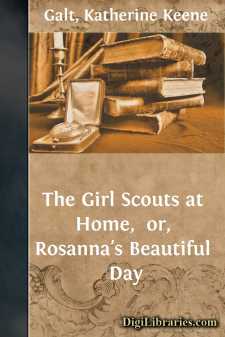Categories
- Antiques & Collectibles 13
- Architecture 36
- Art 48
- Bibles 22
- Biography & Autobiography 813
- Body, Mind & Spirit 142
- Business & Economics 28
- Children's Books 15
- Children's Fiction 12
- Computers 4
- Cooking 94
- Crafts & Hobbies 4
- Drama 346
- Education 46
- Family & Relationships 57
- Fiction 11828
- Games 19
- Gardening 17
- Health & Fitness 34
- History 1377
- House & Home 1
- Humor 147
- Juvenile Fiction 1873
- Juvenile Nonfiction 202
- Language Arts & Disciplines 88
- Law 16
- Literary Collections 686
- Literary Criticism 179
- Mathematics 13
- Medical 41
- Music 40
- Nature 179
- Non-Classifiable 1768
- Performing Arts 7
- Periodicals 1453
- Philosophy 64
- Photography 2
- Poetry 896
- Political Science 203
- Psychology 42
- Reference 154
- Religion 513
- Science 126
- Self-Help 84
- Social Science 81
- Sports & Recreation 34
- Study Aids 3
- Technology & Engineering 59
- Transportation 23
- Travel 463
- True Crime 29
The Girl Scouts at Home, or, Rosanna's Beautiful Day
Categories:
Description:
Excerpt
CHAPTER I
Little Rosanna Horton was a very poor little girl. When I tell you more about her, you will think that was a very odd thing to say.
She lived in one of the most beautiful homes in Louisville, a city full of beautiful homes. And Rosanna's was one of the loveliest. It was a great, rambling house of red brick with wide porches in the front and on either side. On the right of the house was a wonderful garden. It covered half a square, and was surrounded by a high stone wall. No one could look in to see what she was doing. That was rather nice, but of course no one could look out either to see what they were doing on the brick sidewalk, and that does not seem so nice.
At the back of the garden, facing on a clean bricked alley, was the garage, big enough to hold four automobiles. The garage was covered with vines. Otherwise, it would have been a queer looking building, with its one door opening into the garden, and on that side not another door or window either upstairs or down. The upstairs part was a really lovely little apartment for the chauffeur to live in, but all the windows had been put on the side or in front because old Mrs. Horton, Rosanna's grandmother, did not think that chauffeurs' families were ever the sort who ought to look down into the garden where Rosanna played and where she herself sat in state and had tea served of an afternoon.
At one side of the garden where the roses were wildest and the flowers grew thickest was a little cottage, built to fit Rosanna. Grown people had to stoop to get in and their heads almost scraped the ceilings. The furniture all fitted Rosanna too, even to the tiny piano. This was Rosanna's playhouse. She kept her dolls here, and there was a desk with all sorts of writing paper that a maid sorted and put in order every morning before Rosanna came out.
This doesn't sound as though Rosanna was such a poor little girl, does it? But just you wait.
A good ways back of this playhouse was another small building that looked like a little stable. It was a stable—a really truly stable built to fit Rosanna's tiny pony. He had a little box stall, and at one side there was space for the shiniest, prettiest cart.
Rosanna did not go to school. There was a schoolroom in the house, but I will tell you about that some other time. Rosanna disliked it very much: a schoolroom with just one little girl in it! You wouldn't like it yourself, would you?
Rosanna's clothes were the prettiest ever; much prettier then than they are now. And such stacks of them! There was a whole dresser full of ribbons and trinkets and jewelry besides. (Poor little Rosanna!)
She danced like a fairy, and every day she had a music lesson which was given her, like a bad pill, by a severe lady in spectacles who ought never to have tried to smile because it made her face look cracked all over and you felt so much better when the smile was over. Oh, poor, poor, poor little Rosanna!
Do you begin to guess why?
You have not heard me say a word about her dear loving mother and her big joky father, have you? They were both dead! This is such a pitiful thing to have come to any little girl that I can scarcely bear to tell you. Both were dead, and Rosanna lived with her grandmother, who was a very proud and important lady indeed. There was a young uncle who might have been good friends with Rosanna and made things easier but she scarcely knew him. He had been away to college and after that, three years in the army. Once a week she wrote to him, in France; but her grandmother corrected the letters and usually made her write them over, so they were not very long and certainly were not interesting.
Mrs. Horton was sure that her son's little daughter could never be worthy of her name and family if she was allowed to "mix," as she put it, with other children. So Rosanna was not allowed to have any other children for friends, and Mrs. Horton was too blind with all her foolish family pride to see that Rosanna was getting queer and vain and overbearing. Every day they took a drive together, usually through the parks or out the river road. Mrs. Horton did not like to drive down town....


